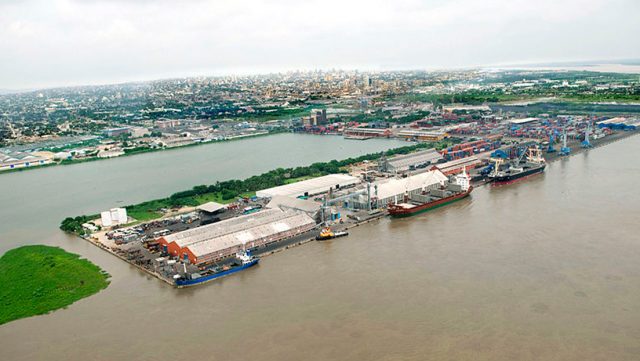The port of Barranquilla, one of the most important in Colombia, is going through an unprecedented crisis because its depth is at a critical historical level, which affects its operation, generates incalculable losses and has prevented the departure of four ships.
According to the report of the General Maritime Directorate, attached to the Ministry of Defense, the depth of the canal dropped to 6.2 meters, which caused an alert among experts because it is the lowest figure in the last thirty years. For this reason, new conditions were established for the entry and exit of vessels from the maritime terminal located in the department of Atlántico, bordered by the Magdalena River and leaving the Caribbean Sea.
Vessels with lengths of up to 180 meters do not have an operation restriction, while those that reach a height of up to 200 meters must enter, after analysis, during the day with a depth of 6.2 to 6.6 meters.
In the same way, an analysis will be made of the maneuverability of each vessel that is above the maximum allowed limits, review RT.
The Colombian Maritime Authority reported that it will also continue to monitor the evolution of navigability conditions and that it will notify any change or restriction that may arise to guarantee «the comprehensive maritime and river safety of the country».
The situation with the dredging
For years, the Magdalena River has presented high levels of sedimentation and low depth, which has caused ships to go to other neighboring ports due to the impossibility of entering.
In addition, the dredging works in the area have been very expensive, insufficient and have not solved the problem, an issue that is aggravated because the city of Barranquilla does not have its own system of this type.
Until September, the losses due to the «worst crisis in the history of the port area of Barranquilla», as stated by the director of the Atlantic Ports Association, Lucas Ariza, amounted to $ 12,000 and, if the situation is not addressed, they could reach $ 14,000 by the end of the year, reports Colombian newspaper La República.
The high sedimentation is found in Bocas de Ceniza, the mouth of the Magdalena River in the Caribbean Sea, which could also generate impacts and overflows. For this reason, the hiring of a new company to carry out the dredging was declared urgent.
Colombian authorities said: «Incalculable damage»
In his Twitter account, Ariza explained that the effects caused by the new restriction on the transit of ships «are incalculable». «The dredge company, present in the city, claims that it cannot intervene in the canal because it does not have appropriate conditions. Meanwhile the port is blocked. Inadmissible».
Faced with the crisis, the government agency Corporación Autónoma Regional del Río Grande de la Magdalena (Corpomagdalena) of Colombia convened last Sunday a technical work group «to seek joint solutions to the navigability of the Magdalena River, and the operation of the Port Zone of Barranquilla». The meeting was attended by the Mayor’s Office of Barranquilla, the General Maritime Directorate, the Luxembourg-based construction company Jan De Nul Group and the company Pilotos del Puerto de Barranquilla.
In another tweet, Corpomagdalena announced that re-cleaning work is being carried out to guarantee the nautical safety of the dredge arranged by the European Dredging Company contractor, so that the works can begin «as soon as possible».
In Barranquilla, a new dredging contractor is expected to be adjudicated this year and one of the most popular is the Chinese company Xin Hai Hu 9.
The most recent low depth was recorded last July, when it reached 6.7 meters. Despite the pandemic, the Port of Barranquilla had managed to increase its cargo movement by 13% until September, compared to the same period in 2020, when it was only 6%.











